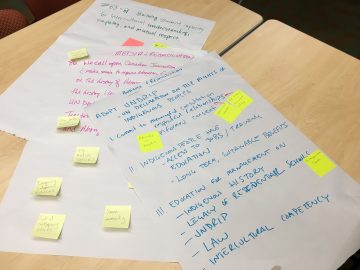We’d like to extend a warm thank you to Kathryn Grafton, Instructor in the Coordinated Arts Program and David Gaertner, Assistant Professor in First Nations and Indigenous Studies, for facilitating a lively workshop for our Classroom Climate series on October 26th. During the session on “Bridging the Knowledge Gap: Indigenous Foundations,” Kathryn and David outlined their approaches to engaging students in conversations about Indigenous topics in the various courses they’ve taught here at UBC.
Resources for Bridging the Knowledge Gap
- UBC/Musqueam Memorandum of Affiliation
- Truth and Reconciliation Commission of Canada: Calls to Action (2015)
- Zoe Todd. “Read the TRC Report” (Youtube video, 2015)
- Handout – Workshop Resources and Works Cited (Gaertner and Grafton, 2015)
Please contact us if you would like a copy of the Powerpoint slides from the workshop, which Kathryn and David kindly shared.
The facilitators both emphasized the need to be flexible and agile in responding to the diverse experiences and background knowledges of their students, especially in when teaching about Indigenous topics in courses.
According to the book How Learning Works (Ambrose et. al., 2010), one of the ways that instructors determine their students’ prior knowledge in a specific area is to tap into learners’ past experiences with the subject matter. These experiences are informed by a variety of factors including but not limited to physical and social location, history of the institutions where they studying, educational policies, and access to information.

“What is Your Call to Action?” Activity (photo: Amy Perreault)
Based on this, Kathryn and David designed an activity that drew upon session participants’ prior knowledge and experiences related to the findings and recommendations of the Truth and Reconciliation Comission of Canada (TRC), published in 2015 and publicly available online. The facilitators led the group through an activity, “What is Your Call to Action?”, where participants worked in small groups to review the TRC Calls to Action. Each group was asked to pick one Call to Action and write it out on the supplied paper. Then, individuals within the groups captured their own reflections on sticky notes for the following questions:
- How does this call apply to the work you do?
- How can you share it with your students?
- In what other ways can you, your department, your faculty, and your field support it?
This example of an activity engaging with TRC recommendations and calls to action is both timely and relevant as we move closer to the opening of the Indian Residential School Dialogues Centre here on campus.
As an educational institution, UBC’s history is intertwined with the histories of residential schools, settler colonialism, and reconciliation. It was just over three years ago that UBC suspended classes to provide opportunities for our entire teaching and learning community to bridge gaps in knowledge and understanding about residential schools and the TRC. Leading up to the TRC national event in 2013, UBC faculty were encouraged to initiate conversations in their classes and create meaningful opportunities for their students to participate in, contribute to, and listen to various public forums happening across the city.
As the Indian Residential School Dialogue Centre opens its doors, it is up to us to share its history and reason for being throughout our community; and as new students, faculty and staff join our teaching and learning community, we will need to find relevant ways to communicate its history and purpose here on campus as a special space for reflection and further learning about the history and legacy of residential schools. We need to continue to bridge gaps in knowledge between our institutional memory of these events and histories as a way to open up and continue conversations about ongoing struggles that local and global Indigenous communities face as a result of ongoing colonial policies and practices in Canada.
Like Kathyn and David, we encourage instructors to reflect on ways that they can create meaningful opportunities for these conversations in their classes by drawing on responses to the TRC recommendations that connect to their disciplinary contexts. We also see value in thinking further about a quote Kathryn and David presented in the workshop: “Decolonization is not a metaphor” (Tuck and Yang, 2012); many of the conversations that we have in our Classroom Climate series surface questions about land, history, policies and how focusing learning in these areas can enhance and transform our overall approaches to teaching, learning, and student engagement.
We acknowledge that the TRC Calls to action are a starting point and that meaningful engagement transcends the walls of the university. We were also struck by the facilitators’ thoughtful urging for us to pay critical attention to actions taken towards fulfilling TRC calls to action, and to rigorously think about our responsibilities and accountability as we shift toward the end of 2016. As Ian Mosbey discusses in his recent crowdsourcing project to tally the answered calls to action, it has been 513 days since the Truth and Reconciliation Commission released its 94 calls to action — we have still have a long ways to go.